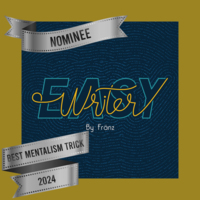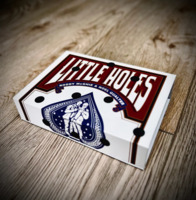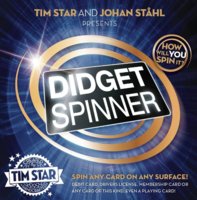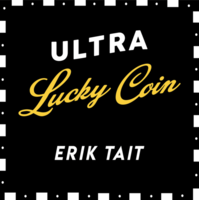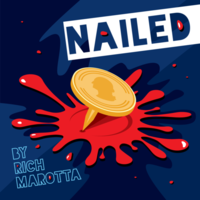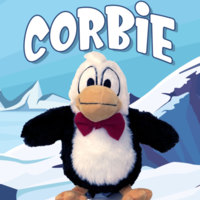Billet Masterclass (Online Instructions plus Materials) by Alexander Marsh and The 1914
| List price: | |
| Price: | $42.75 |
| You save: | $2.25 (5%) |
"Your work on billets, the rationales etc are brilliant and your clear bowl Q&A at the end is totally worth the price of the entire product. Loved it."
- Marc Spelmann
"Outstanding! I haven't been this excited about a mentalism video for ages... The thought behind, and the motivation of, your billet peek make it perfect. It's probably one of the best peeks out there. Your Bowl of Billets is simply wonderful, you've provided such a great structure and variety of effects and reveals, it's fantastic, very well done. It's great thinking."
- Marc Paul
"Thank you for releasing material you've actually performed in front of real audiences and in PR situations under the eagle eyes of journalists. I love your peeks and especially your Q&A, which has a great structure."
- Harry Lucas
Mastering billets transformed Alexander Marsh from a self-confessed mediocre mentalist to the HEADLINE ACT for one of the world's largest touring magic shows!
And now he's going to teach you EVERYTHING he knows.
But what even is a billet?
The word Billet is mentalist-speak for any small slip of paper utilised during your performance.
They appear innocent to your audience, but once you learn Alex's billet handling secrets, you will possess the knowledge and power to use them to create television-worthy displays of mind reading and mind control AT A MOMENT'S NOTICE!
Broken down into bite-size sections, each lesson builds upon the previous, meaning value will be found for every skill level. If you're new to billets, this is a perfect place to start; you'll be reading minds after the first three lessons alone.
If you're a seasoned billet worker, you're going to fall madly in love. This is a project you will keep coming back to. Not only are you going to learn the greatest peek since Acidus Novus, Alex is going to give you his ENTIRE, hour-long Question and Answer (Q&A) act as performed at the Edinburgh Fringe Festival in 2014 (and it uses nothing more than some pens, some billets, a clear bowl and some envelopes).
Here's how this project came to be:
During the 2020 lockdown, Alexander Marsh filmed a two-hour billet lecture in his kitchen and sold it directly to magicians from his personal website.
It was SO GOOD, two of Britain's most celebrated mentalists immediately endorsed it; Marc Paul and Marc Spelmann (Magician X from BGT).
But Alex limited his self-shot seminar to just 100 copies.
We have received countless requests to create a billet course, so we begged Alex to let us release it to a wider audience. But he said no; he wanted to honour his initial promise of only 100 copies sold.
So we made him a deal.
We offered to re-shoot the entire lecture with multiple cameras over two days at The 1914 studio; We asked Alex to cover even MORE content; And we offered to EXPAND it even further with valuable contributions from fellow billet-connoisseur Lewis Le Val.
Finally, he said YES.
What started out as a two-hour lecture quickly doubled in size (and some) to a FIVE HOUR, MONSTER MASTERCLASS!
To date, this is our largest release ever.
This really is the DEFINITIVE video guide to billets. Never has there been a more comprehensive, detailed, in-depth examination of this cornerstone of mentalism.
Here's what's covered:
You will learn the classic centre tear and why it's flawed. Alex will then teach you his devious improvement along with a fun, commercial routine to apply it to which involves divining your spectator's secret cocktail ingredient, which can be literally anything (unicorn tears, anyone?).
You will learn an array of classic and contemporary billet switches including the Annemann Switch, the Al Baker Switch and Alex's very own Unfolding Switch which requires ZERO misdirection whatsoever.
You will learn how to make a secret billet switching envelope on the fly. You'll also learn how to construct a more robust switching envelope with some prior preparation for an extra layer of deception.
Alex will teach you how to read stolen billets and will provide you with many routine ideas with the help of master mentalist Lewis Le Val. Between them, they offer contrasting presentations for the same effects; perfect inspiration for mystical performers like Lewis, or more buoyant personalities like Alex.
Alex will then disclose the secret to his very own, outrageous billet peek. If you're a fan of Acidus Novus, you will LOVE this. It can be executed directly under your spectator's nose, even as they're burning your hands.
You'll then learn even more, powerful effects including Alex's rendition of Bob Cassidy's Fourth Dimensional Telepathy; an engaging routine for both close up or stage where three spectators have their thoughts divined, one at a time, in a theatrical manner.
And finally, Alex pieces together everything you've learnt to teach you an entire stage act! By the end of the course, you'll be able to provide an hour's entertainment to a full-house theatre, using barely any props. This is Alex's simple-yet-beautiful Q&A act of Edinburgh Fringe fame.
There really is so much more to gain from this course but so little space to write it. Access now to see for yourself just how powerful your billet work can become.
Forget the latest gizmos and gadgets. This is the PUREST form of mentalism.
Master billets. Master the art.
ASK HERE
Featured Magic Tricks
4 star 60%
3 star 0%
2 star 0%
1 star 0%

 Highly Recommended
Report this review
Highly Recommended
Report this review
If you are new to billet work, and are eager to learn, this course would be an excellent place to start. If you have an extensive background in billet work, you probably do not need this program, but you may still want to get it. I'm a big believer in continuing education, and love to learn. Anyone who loves billet work and loves to learn will likely enjoy this program.
There are so many methods, ideas, subtleties and insights shared throughout this program. There is something for everyone. Many things for everyone.
Alex and Lewis both make the point repeatedly that you do not have to do anything exactly as they show it. Learn the techniques then mix and match to come up with handlings and routines that fit your style and preferences. I agree with this mindset.
The Q & A routine was not really a good fit for me. And that's okay. It might be a great fit for you. I have studied the Q & A extensively over the past several years, and have purchased just about every release on the subject. And I've come up with my own handlings that do fit me well. I like to study everything that is available on subjects that interest me the most, then figure out what works best for my preferences, including developing new approaches. And I advise you to do the same.
Over-all, this is a fantastic course that I recommend highly.

 Know Your Skill Set
Report this review
Know Your Skill Set
Report this review
However, it is important to know what you're getting into.
I purchased this download during the holiday season so I had the privilege of getting it half off. In my opinion, based on my knowledge of billets before purchasing the download, knowing what I know now $45 may have been a stretch. This is not because the information isn't that valuable. This truly is a masterclass. It's just important to know that if you are already familiar with billet work, half of the masterclass won't be applicable.
About seven of the videos go over the details of switches like the Al Baker switch, Annemann switch, and using envelopes for switches. I skimmed through these because I was already familiar with these methods.
These are the highlights of the masterclass if you are even the most seasoned billet worker:
1.) The Discussions: Lewis Le Val sits down with Marsh and they have multiple discussions about routine and presentation ideas.
2.) The Marsh Peek and 4DT: According to Marsh, this is his own peek that he uses often. I can confirm that he uses it often because I've seen him use it in multiple televised performances seen on his YouTube page. It's a fantastic peek to use if you are using an envelope for your routine. I will admit that the handling for this peek is very similar to a billet peek seen in Richard Osterlind's 2nd Penguin Live Lecture. The best part of learning this peek is its application with 4DT. I've performed Bob Cassidy's 4DT and it is a killer. The only criticism is it does take a somewhat extensive set up. The Marsh Peek allows you to perform 4DT with just three billets and three regular envelopes, that's it. Marsh's 4DT is not as deceptive as Cassidy's 4DT because in Cassidy's routine the spectator can slide their folded billet into the envelope themselves. In Marsh's 4DT you have be holding onto the billet and place it inside the envelope yourself for the first billet. The next two spectators can slide the billets into their envelopes themselves. I still think it's deceptive and I've added three envelopes to my Maverick EDC Carrier to do just this.
3.) Q&A: This part of the download was a goldmine for me. His use of the Q&A has inspired me to structure future potential stage shows around his ideas. He goes through the design of the cards he uses to get the most information possible. He then goes through a few effects utilizing these Q&A cards that sit in a clear bowl. One is very similar to Christopher Carter's 3 billet routine shown in his Penguin Live Lecture, but his way of marking the billets is wonderful and clever. He then goes on to explain audience reading, extra bonuses, and has a discussion with Le Val about how he uses Q&A with a slightly different style. He gives many tips on how you can expand the Q&A over the course of a show. I won't go into detail, but it will allow you to pick volunteers in a way true mentalists would and it can inspire routines.
As a whole, I feel that these three parts of the download was worth a $20 download. Do I think it's worth a $45 download since I already was familiar with about half the information?
I still think so.
If you want to dive into mentalism for the first time and you're brand new to billet work this is a MUST HAVE and would be ranked 10 out of 5 stars.
If you are a seasoned billet worker but are looking for some more ideas, you should definitely still find some nuggets of information.
I am unfamiliar with the timeline of this release and the release of the official 1914 Billets, but the biggest criticism I have is that Marsh doesn't ever use the 1914 Billets in this download. He uses his own that are a bigger size. If the download was released before the billets then this criticism is invalid, but if they were out it would have been nice to see him use the ones that the 1914 recommends using.

 Know Your Current Skill Set
Report this review
Know Your Current Skill Set
Report this review
However, it is important to know what you're getting into.
I purchased this download during the holiday season so I had the privilege of getting it half off. In my opinion, based on my knowledge of billets before purchasing the download, knowing what I know now $45 may have been a stretch. This is not because the information isn't that valuable. This truly is a masterclass. It's just important to know that if you are already familiar with billet work, half of the masterclass won't be applicable.
About seven of the videos go over the details of switches like the Al Baker switch, Annemann switch, and using envelopes for switches. I skimmed through these because I was already familiar with these methods.
These are the highlights of the masterclass if you are even the most seasoned billet worker:
1.) The Discussions: Lewis Le Val sits down with Marsh and they have multiple discussions about routine and presentation ideas.
2.) The Marsh Peek and 4DT: According to Marsh, this is his own peek that he uses often. I can confirm that he uses it often because I've seen him use it in multiple televised performances seen on his YouTube page. It's a fantastic peek to use if you are using an envelope for your routine. I will admit that the handling for this peek is very similar to a billet peek seen in Richard Osterlind's 2nd Penguin Live Lecture. The best part of learning this peek is its application with 4DT. I've performed Bob Cassidy's 4DT and it is a killer. The only criticism is it does take a somewhat extensive set up. The Marsh Peek allows you to perform 4DT with just three billets and three regular envelopes, that's it. Marsh's 4DT is not as deceptive as Cassidy's 4DT because in Cassidy's routine the spectator can slide their folded billet into the envelope themselves. In Marsh's 4DT you have be holding onto the billet and place it inside the envelope yourself for the first billet. The next two spectators can slide the billets into their envelopes themselves. I still think it's deceptive and I've added three envelopes to my Maverick EDC Carrier to do just this.
3.) Q&A: This part of the download was a goldmine for me. His use of the Q&A has inspired me to structure future potential stage shows around his ideas. He goes through the design of the cards he uses to get the most information possible. He then goes through a few effects utilizing these Q&A cards that sit in a clear bowl. One is very similar to Christopher Carter's 3 billet routine shown in his Penguin Live Lecture, but his way of marking the billets is wonderful and clever. He then goes on to explain audience reading, extra bonuses, and has a discussion with Le Val about how he uses Q&A with a slightly different style. He gives many tips on how you can expand the Q&A over the course of a show. I won't go into detail, but it will allow you to pick volunteers in a way true mentalists would and it can inspire routines.
As a whole, I feel that these three parts of the download was worth a $20 download. Do I think it's worth a $45 download since I already was familiar with about half the information?
I still think so.
If you want to dive into mentalism for the first time and you're brand new to billet work this is a MUST HAVE and would be ranked 10 out of 5 stars.
If you are a seasoned billet worker but are looking for some more ideas, you should definitely still find some nuggets of information.
I am unfamiliar with the timeline of this release and the release of the official 1914 Billets, but the biggest criticism I have is that Marsh doesn't ever use the 1914 Billets in this download. He uses his own that are a bigger size. If the download was released before the billets then this criticism is invalid, but if they were out it would have been nice to see him use the ones that the 1914 recommends using.

 Know Your Current Skill Set
Report this review
Know Your Current Skill Set
Report this review
However, it is important to know what you're getting into.
I purchased this download during the holiday season so I had the privilege of getting it half off. In my opinion, based on my knowledge of billets before purchasing the download, knowing what I know now $45 may have been a stretch. This is not because the information isn't that valuable. This truly is a masterclass. It's just important to know that if you are already familiar with billet work, half of the masterclass won't be applicable.
About seven of the videos go over the details of switches like the Al Baker switch, Annemann switch, and using envelopes for switches. I skimmed through these because I was already familiar with these methods.
These are the highlights of the masterclass if you are even the most seasoned billet worker:
1.) The Discussions: Lewis Le Val sits down with Marsh and they have multiple discussions about routine and presentation ideas.
2.) The Marsh Peek and 4DT: According to Marsh, this is his own peek that he uses often. I can confirm that he uses it often because I've seen him use it in multiple televised performances seen on his YouTube page. It's a fantastic peek to use if you are using an envelope for your routine. I will admit that the handling for this peek is very similar to a billet peek seen in Richard Osterlind's 2nd Penguin Live Lecture. The best part of learning this peek is its application with 4DT. I've performed Bob Cassidy's 4DT and it is a killer. The only criticism is it does take a somewhat extensive set up. The Marsh Peek allows you to perform 4DT with just three billets and three regular envelopes, that's it. Marsh's 4DT is not as deceptive as Cassidy's 4DT because in Cassidy's routine the spectator can slide their folded billet into the envelope themselves. In Marsh's 4DT you have be holding onto the billet and place it inside the envelope yourself for the first billet. The next two spectators can slide the billets into their envelopes themselves. I still think it's deceptive and I've added three envelopes to my Maverick EDC Carrier to do just this.
3.) Q&A: This part of the download was a goldmine for me. His use of the Q&A has inspired me to structure future potential stage shows around his ideas. He goes through the design of the cards he uses to get the most information possible. He then goes through a few effects utilizing these Q&A cards that sit in a clear bowl. One is very similar to Christopher Carter's 3 billet routine shown in his Penguin Live Lecture, but his way of marking the billets is wonderful and clever. He then goes on to explain audience reading, extra bonuses, and has a discussion with Le Val about how he uses Q&A with a slightly different style. He gives many tips on how you can expand the Q&A over the course of a show. I won't go into detail, but it will allow you to pick volunteers in a way true mentalists would and it can inspire routines.
As a whole, I feel that these three parts of the download was worth a $20 download. Do I think it's worth a $45 download since I already was familiar with about half the information?
I still think so.
If you want to dive into mentalism for the first time and you're brand new to billet work this is a MUST HAVE and would be ranked 10 out of 5 stars.
If you are a seasoned billet worker but are looking for some more ideas, you should definitely still find some nuggets of information.
I am unfamiliar with the timeline of this release and the release of the official 1914 Billets, but the biggest criticism I have is that Marsh doesn't ever use the 1914 Billets in this download. He uses his own that are a bigger size. If the download was released before the billets then this criticism is invalid, but if they were out it would have been nice to see him use the ones that the 1914 recommends using.

 BEST in its Class
Report this review
BEST in its Class
Report this review

Act Builder beta





